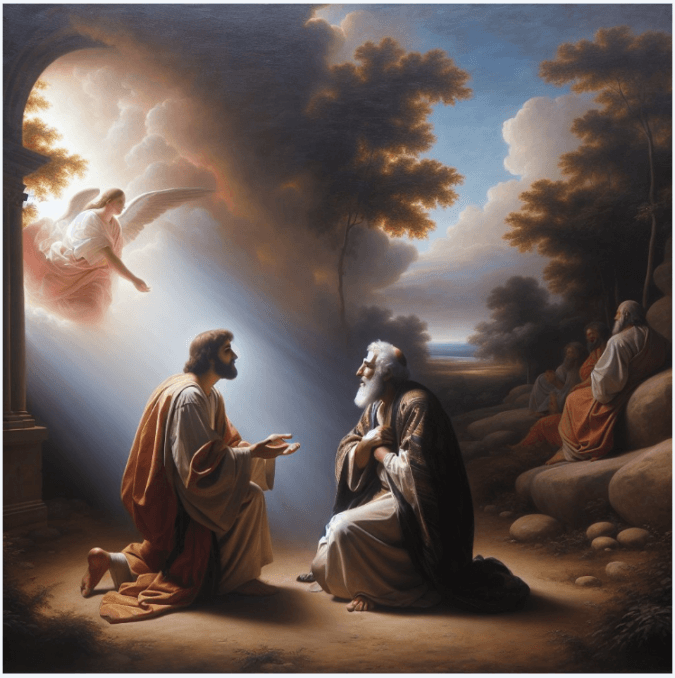JACOB MAKES A VOW
Jacob wakes up overwhelmed by awe and fear. He makes a powerful connection between the Lord’s appearance to him and the place where he slept. He calls the place Bethel, which means “house of God,” and sets up a stone pillar to commemorate the spot (Genesis 28:16–19).
Finally, Jacob makes a vow. If God will be with him and provide for his needs and bring him back to his father’s household in peace, Jacob will make the Lord his God. He will worship him at this place, and he will give to the Lord ten percent of all God gives to him (Genesis 28:20–22).
Jacob seems to be bargaining with God. He was actually bargaining for less than God had promised (v. 14).
His faith was not strong enough to take God at His word, so he had to make his tithe conditional on God’s performance of His part of the agreement, Another interpretation, however, is that the “if” is simply an inherent part of all Hebrew oaths and that Jacob was binding himself to give a tenth unconditionally (see Num. 21:2; Judg. 11:30, 31; 1 Sam. 1:11 for similar Hebrew oaths).
Genesis 28:18-22 KJV
[18] And Jacob rose up early in the morning, and took the stone that he had put for his pillows, and set it up for a pillar, and poured oil upon the top of it.
[19] And he called the name of that place Beth–el: but the name of that city was called Luz at the first.
[20] And Jacob vowed a vow, saying, If God will be with me, and will keep me in this way that I go, and will give me bread to eat, and raiment to put on,
[21] So that I come again to my father’s house in peace; then shall the LORD be my God:
[22] And this stone, which I have set for a pillar, shall be God’s house: and of all that thou shalt give me I will surely give the tenth unto thee.
Genesis 28:18 KJV
And Jacob rose up early in the morning, and took the stone that he had put for his pillows, and set it up for a pillar, and poured oil upon the top of it.
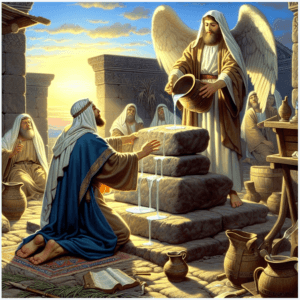 The mere setting up of the stone might have been as a future memorial to mark the spot; and this practice is still common in the East, in memory of a religious vow or engagement. But the pouring oil upon it was a consecration.
The mere setting up of the stone might have been as a future memorial to mark the spot; and this practice is still common in the East, in memory of a religious vow or engagement. But the pouring oil upon it was a consecration.
The Lord has visited Jacob in a dream, giving to him the promises of Abraham, as well as reassurance that God will be with him and bring him back to the land of promise (Genesis 28:10–15).
When he wakes up, Jacob is overwhelmed by what he identifies as the holiness of the place where he slept. He calls it “the house of God” and “the gateway to heaven” (Genesis 28:16–17).
Now Jacob commemorates the holiness of this place. He takes the stone where his head rested during his dream and sets it up as a pillar. This might mean that Jacob took what was once a long, flat-laying stone and stood it upright on end.
He pours oil on the top of the stone as part of this ceremony. This stone should not be confused with an altar. Jacob’s marker here is a post or standing stone, an indication of this holy place which Jacob will formally name in the next verse.
Genesis 28:19 KJV
And he called the name of that place Beth–el: but the name of that city was called Luz at the first.
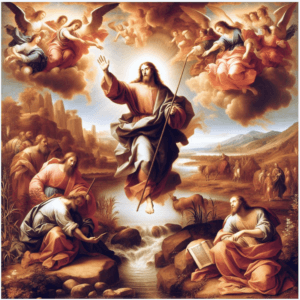 Accordingly he gave it a new name, Beth-el, “the house of God” (Hosea 12:4); and it will not appear a thing forced or unnatural to call a stone a house, when one considers the common practice in warm countries of sitting in the open air by or on a stone, as are those of this place.
Accordingly he gave it a new name, Beth-el, “the house of God” (Hosea 12:4); and it will not appear a thing forced or unnatural to call a stone a house, when one considers the common practice in warm countries of sitting in the open air by or on a stone, as are those of this place.
While travelling from his homeland in Canaan to Mesopotamia (Genesis 28:1–2), Jacob spends the night sleeping with his head resting on a rock (Genesis 28:10–11). As he sleeps, God appears in a vision of a heavenly staircase, or ladder, filled with angels.
In this vision, God passes along to Jacob all of the promises given to Abraham, along with reassurances that God will be with Jacob wherever he goes (Genesis 28:12–18).
Jacob is so convinced of the holiness of the place where the Lord visited him that he decides to rename it. Previously called Luz, the place will now be known as Bethel. The word Bethel means “house of God.”
Jacob also sets up the rock on which he slept as a marker, anointing it with oil in some kind of ceremony. This spot will continue to be meaningful well into Israel’s future, as a place where God meets His people.
Genesis 28:20 KJV
And Jacob vowed a vow, saying, If God will be with me, and will keep me in this way that I go, and will give me bread to eat, and raiment to put on,
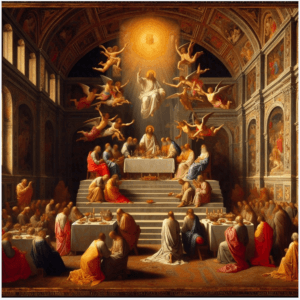 His words are not to be considered as implying a doubt, far less as stating the condition or terms on which he would dedicate himself to God.
His words are not to be considered as implying a doubt, far less as stating the condition or terms on which he would dedicate himself to God.
Let “if” be changed into “since,” and the language will appear a proper expression of Jacob‘s faith – an evidence of his having truly embraced the promise. How edifying often to meditate on Jacob at Beth-el.
After commemorating the holiness of the place where the Lord visited him in a dream (Genesis 28:12–13), Jacob now acknowledges the content of what the Lord said to him.
He does this in the form of a conditional vow, declaring that if the Lord will do these things, Jacob will respond with actions of his own. Jacob’s vow should be seen not as a testing of the Lord so much as a prayer of faith.
Jacob seems to be saying that since the Lord can do these things, and has said He will do these things, Jacob is willing to trust and obey. Specifically, Jacob mentions God being with him and keeping him safe.
He also adds two things God did not say explicitly: providing for him bread and clothing. In the following verses, he will mention one more condition and then the commitments he is binding himself to fulfill for God.
Genesis 28:21 KJV
So that I come again to my father’s house in peace; then shall the LORD be my God:
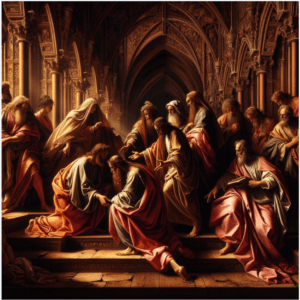 What is he doing?
What is he doing?
He wants to trade with God.
He says, “Now, God, if You will do this for me. . . .” But God has already told him that He is going to do every one of these things for him—“ I am going to keep you; I am going to bring you back to this land; I am going to give you this land; and I’m going to give you offspring.”
Then Jacob turns around and bargains with Him, “If You will do it, then I’ll serve You.” God doesn’t do business with us that way. He didn’t do business that way with Jacob either. If He had, Jacob would never have made it back to that land.
God brought him back into that land by His grace and mercy. When Jacob did finally come back to Bethel, he came back a wiser man.
Do you know what he came back to do?
To worship and praise God for His mercy. God had been merciful to him. Many people even today say they will serve the Lord if He will do such and such. You won’t do anything of the kind, my friend.
He doesn’t do business that way. He will extend mercy to you, and He will be gracious to you without asking anything in return. But He does say that if you love Him, you will really want to serve Him. That will be the bondage of love.
It is the same kind of love a mother has for the little child. She becomes its Support System. That’s the way that He wants you and me.
In a dream, the Lord has appeared to Jacob and promised to be with him and bring him back to the land of promise. Now awake, Jacob is responding to that promise.
If the Lord will really be with him, and keep me safe, and provide food and clothing, and, bring him back to his father’s household in peace, then the Lord will be his God.
When we think of Jacob’s situation, his emphasis on these things makes sense. Jacob was literally running away from his home to spare his life from his brother’s fury (Genesis 27:41).
He is apparently alone in the wilderness, traveling to find a wife among his mother’s relatives (Genesis 28:1–2). Before this visit from the Lord, his future was murky and his path was dangerous.
Now, because of God, Jacob has hope that he will be provided for, kept safe, and be able to return home.
It is interesting to note that God has already promised Jacob that He will be with him. The Lord has already made Jacob His man. Jacob doesn’t declare the Lord to be his God in hopes that the Lord will take care of him.
Jacob makes that declaration in response to God’s promises and care. His worship and commitment follows God’s gifts of grace, just as our does (Ephesians 2:8–10).
Genesis 28:22 KJV
And this stone, which I have set for a pillar, shall be God’s house: and of all that thou shalt give me I will surely give the tenth unto thee.
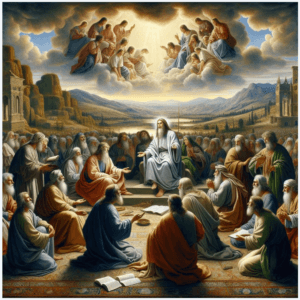 So Jacob erects this stone. He is trying to make a deal with God! And a great many of us are trying to make a deal with God. Oh, my friend, He just wants to become your Father through faith in Christ.
So Jacob erects this stone. He is trying to make a deal with God! And a great many of us are trying to make a deal with God. Oh, my friend, He just wants to become your Father through faith in Christ.
Jacob concludes his vow before the Lord. In the previous verses, he has declared that if God does all He has said He would do for Jacob, then Jacob would make the Lord his God (Genesis 28:20–21).
In addition, he now says that the stone he has set up for a commemorative pillar will become God’s house. This stone was the very same one on which Jacob rested his head while sleeping in the wilderness (Genesis 28:16–18).
In other words, Jacob would return to this place to worship the Lord. In a previous verse, Jacob renamed the place “Bethel,” meaning “house of God.” Bethel would continue to be a significant meeting place with God for Israel far into the future.
Jacob completes his vow with a promise to give to God a tenth of all God gives to him. Previously, Jacob’s grandfather Abraham gave to God’s priest Melchizedek such a tithe (Genesis 14:20).
Jacob volunteers to worship the Lord in this financial way as well. Giving to God specific tithes and offerings was one of the ways Israel would later demonstrate their obedience to and dependence on the Lord.
I hope that you have really enjoyed this post,
Please Leave All Comments in the Comment Box Below ↓

